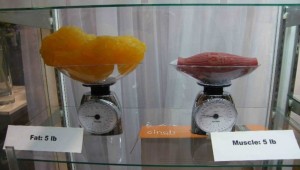 What is water weight and how is it different to fat?
What is water weight and how is it different to fat?
Fat is simple: your body stores excess calories as fat, leading to weight gain when you are eating more than your body burns in a day (there are 3,500 calories in one pound of fat). It takes time to gain fat, and it takes time to lose fat. But water weight can come and go in a matter of days, and it can mean the difference between being several pounds lighter or heavier.
Your body is a clever thing: it’ll ‘hide’ water away in all sorts of places – and usually (annoyingly) in the places which you’d normally gain fat. How? Well, it’s good at retaining water cells in between its tissue cells, and it does this as a response to pressure changes caused by a variety of factors, including dehydration and high sodium intake. Sudden changes in the pressure of your blood vessels can cause water cells to leak out of your bloodstream and fill the spaces between the tissue cells. If there are enough, the spaces become ‘crowded’ and trap water. When this water can’t return to the bloodstream, it adds weight to your body – which, for most people, is rather unwelcome.
If you’ve ever stood on the scales and wondered why you’re fluctuating by a few pounds every time you weigh yourself in a short space of time, it may not be time to throw the scales out – it’s probably water weight. But there is no way to be certain if the weight you gain is water or fat just by looking at yourself. It’s notable that water weighs more than fat and can make you feel bloated and uncomfortable – in fact, usually more so than fat. But if you’re gaining and losing random amounts of weight in a short space of time, it’s worth bearing in mind that it’s probably water; while fat takes time to convert and store, water weight can literally appear overnight. Try weighing yourself when you first wake up every morning, and compare your weights. If you see small fluctuations, anywhere from half a pound to four pounds, throughout the week, you are probably retaining water. However, if your body fat percentage goes up, you’ve gained fat.
Losing water weight:
There are short-term and long-term ways to lose water weight. ‘Sweating it out’ actually works in the short-term – spending some time each day in a dry sauna will make your body sweat out some of the excess water weight. Certain body wraps also help. But though it’s easier to lose water weight than weight gained from fat, retaining water weight will be a continuous problem if your diet and lifestyle allow it. For example, water weight is commonly caused by high salt levels in your body and dehydration. For women, you’ll also find that your menstrual cycle is a factor – at certain times of the month you’ll feel more bloated than others. But by making a few changes, you’ll find your body becomes less likely to hold on to all that water weight:
- Drink more water. Sounds counterintuitive maybe, but water will flush excess fluids and salts right out of your body.
- Exercise! Sweating is a good thing – you’ll drain excess fluids through perspiration.
- Cut down on salt. Water follows salt. When you take in too much sodium, your body retains water to counter it. It’s honestly as simple as that! By making a conscious decision to cut the salt and sodium out of your diet, your body will shed pounds of weight that was just fluid being retained thanks to the sodium.
- Include natural diuretics in your diet – potassium, magnesium and fibre.
- Bananas, apricots, avocados and raisins are rich in potassium, which helps regulate your body’s fluid levels and relieves water retention.
- Green vegetables, seeds and nuts are high in magnesium, which also helps relieve water retention.
- Foods which are high in fibre such as whole grain cereal, whole grain rice and cabbage help with digestion, and relieve water retention and bloating.
Losing fat:
Fat is harder to shed than water weight – if you’re trying to lose fat, you would need to maintain a calorie deficiency of approximately 500 calories per day. This is why losing fat is a slow process: in order to lose the weight you gained in fat, you’d need to consume 500 calories less than normal every day for one week to lose one pound of fat – or exercise enough every day to burn that 500 calories. The winning tactic is to combine the two strategies: exercising to burn a certain amount of calories per day and cutting the difference from your diet. At this rate, you’d lose about one or two pounds of fat per week – and keep it off. You should also consider your diet and cut the amount of fat (particularly saturated fat) you consume. Remember, not all calories were created equal: consuming a 500-calorie meal from fatty foods (i.e. one Big Mac) and a 500-calorie meal from leaner sources (like lean protein and veggies) will have very different impacts on your body, especially if you make a habit of it!
 Supplement Judge Unbiased Supplement Reviews – Do they really work??
Supplement Judge Unbiased Supplement Reviews – Do they really work??




